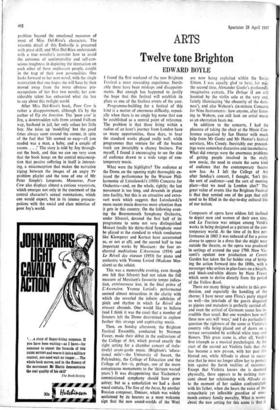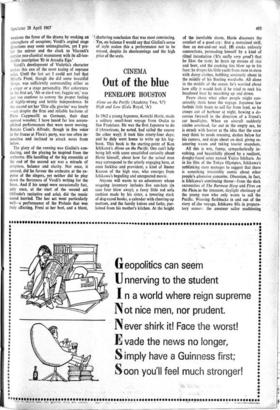Twelve tone Brighton ARTS
EDWARD BOYLE
I found the first weekend of the new Brighton Festival a most rewarding experience. Inevit- ably there have been mishaps and disappoint- ments. But enough has happened to justify the hope that this festival will establish its place as one of the liveliest events of the year.
Programme-building for a festival of this kind is a matter of enormous difficulty, especi- ally when there is no single big name that can be established as a central point of reference.
The problem is that those living within a radius of an hour's journey from London have so many opportunities, these days, to hear the standard works played really well; while programmes that venture far off the beaten track are invariably a chancy business. For myself, I found it encouraging to see the size of audience drawn to a wide range of con- temporary music.
What were the highlights? The audience at the Dome on the opening night thoroughly en- joyed the performance by the Warsaw Phil- harmonic of Lutoslawski's (1956) Concerto for Orchestra—and, on the whole, rightly; the last movement is too long, and descends in places into facility, but this is an attractive and extro- vert work which suggests that Lutoslawski's more recent music deserves more attention than it gets in this country. On the following even- ing the Bournemouth Symphony Orchestra, under Silvestri, devoted the first half of its programme to some not very distinguished Mozart (really his thirty-third Symphony must be played at the standard to which conductors like Klemperer and Kertesz have accustomed us, or not at all), and the second half to two important works by Messiaen: the four or- chestral meditations L'Ascension (1934) and Le Revdl des oiseaux (1953) for piano and orchestra with Yvonne Loriod (Madame Mes- siaen) as the soloist.
This was a memorable evening, even though one felt that Silvestri had not taken the full measure of Messiaen's favourite tempo indica- tion, extremement lent, in the final prier& of L'Ascension. Yvonne Loriod's performancd seemed almost miraculous in the clarity with which she revealed the infinite subtleties of pitch and rhythm in which Le Revell des oiseaux abounds. One would like to believe (and I think it was the case) that a number of listeners left the Dome determined to explore further this strange and captivating music.
Then, on Sunday afternoon, the Brighton Festival Ensemble, conducted by Norman Foster, made their debut in the auditorium of the College of Art, which proved exactly the right setting for a chamber concert of (rela- tively) avant-garde music. (Brighton's 'educa- tional mile'—the University of Sussex, the Polytechnic, the College of Education and the College of Art—is, perhaps, one of the more conspicuous monuments to the `thirteen wasted years?) It was disappointing that Tischenko's commissioned symphony should have gone astray; but as a consolation we had a short vocal cantata, The Sun of the Incas, by another Russian composer, Dmisov, which was widely acclaimed by its hearers as a most welcome sign that the new sound-Worlds of the Weil are now being exploited within the Soviet Union. I was equally glad to hear, for Otgy
the second time, Alexander Goehr's profoundly imaginative cantata, The Deluge (I am still haunted by the violin solo at the very end, faintly illuminating 'the obscurity of the dark- ness'), and also Webern's six-minute Concerto for Nine Instruments : how anyone, after listen- ing to Webern, can still look on serial music as an aberration beats me.
In addition to the concerts, I had the pleasure of taking the chair at the Music Con- ference organised by Ian Hunter with much help from Mr Goehr and Mr Hunter's festival secretary, Mrs Creedy. Inevitably our proceed- ings were somewhat discursive and inconclusive. What did emerge were the enormous problems of getting people involved in the really new music, the need to create the same kind of audience that the contemporary theatre now has. As I left the College of Art after Sunday's concert, I thought, 'Isn't this the sort of audience—and the sort of meeting place—that we need in London also?' The great value of events like the Brighton Festival is that they remind one of the gaps that still need to be filled in the day-to-day cultural life of our nation.
Composers of opera have seldom felt inclined to depict men and women of their own time, and La Traviata was unique among Verdi's works in being designed as a picture of the con- temporary world. At the time of its first per- formance in 1883 it was unheard of for a prima donna to appear in a dress that she might wear outside the theatre, so the opera was produced in settings of around the year -1700. Now Vis- conti's opulent new production at Covent Garden has taken the far bolder step of bring- ing the action forward into the 1890s, with a messenger who arrives in plus-fours on a bicycle, and black-and-white decors by Nato Frasca which seem to derive directly from the period of the Yellow Book.
There are many things to admire in this pro- duction, and especially the handling of the chorus; I have never seen Flora's party staged so well—the interlude of the guests disguised as gipsies and matadors is perfectly carried off, and even the arrival of Germont seems less in- credible than usual. But one wonders how well these new sets will 'wear,' and I do particularly question the rightness of the scene at Violetta's country villa being placed out of doors on a terrace surrounded by artificial white trees and flowers. This great scene is, after all, Verdi's first triumph as a musical psychologist. At the start of the second act Violetta feels that she has become a new person, with her past life blotted out, while Alfredo is about to recog- nise that he must no longer allow her to protect him against the harsh realities of existence. Except that Violetta knows she is doomed physically, there appears to be nothing tran- sient about her relationship with Alfredo .up to the moment of her sudden confrontation with his father, when she hears the voice of the sympath4tic yet inflexible guardian of nine- teenth century family morality. What is wrong about the new setting for this scene is that it weakens the force of the drama by evoking an atmosphere of escapism; Verdi's orginal stage directions may seem unimaginative, yet I pre- fer the mirror and the clock to Visconti's outsize neo-classical monument with its all-too- visible inscription 'Et in Arcadia Ego.'
Verdi's development of Violetta's character makes this one of the most taxing of soprano roles. Until the last act I could not feel that MireIla Freni, though she did some beautiful things, was sufficiently commanding either as a singer or a stage personality. Her coloratura in the first act, "Ah se cio e ver, fuggite mi,' was just too cautious to convey the proper feeling of highly-strung and brittle independence. In the second act her Dite alla giovine' was lovely —yet despite the firm and reliable baritone of Piero Cappuccilli as Germont, their duet seemed wooden; I have heard far less accom- plished performances that were more moving. Renato Cioni's Alfredo, though in fine voice in the fracas at Flora's party, was too often in- sensitive and inclined to attack notes from below.
The glory of the evening was Giulini's con- ducting, and the playing he inspired from the orchestra. His handling of the big ensemble at the end of the second act was a miracle of crispness, balance and clarity. Not once, it seemed, did he favour the orchestra at the ex- pense of the singers, yet neither did he play down the fierceness of Verdi's writing for the brass. And if his tempi were occasionally fast, only once, at the start of the second act (Alfredo's recitative and aria), did the music sound hurried. The last act went particularly well—a performance of the Prelude that was truly affecting, Freni at her best, and a blunt, t shattering conclusion that was most convincing. Yes, on balance I would say that Giuliai's sense of style makes this a performance not to be missed, despite its shortcomings and the high price of the seats.







































 Previous page
Previous page